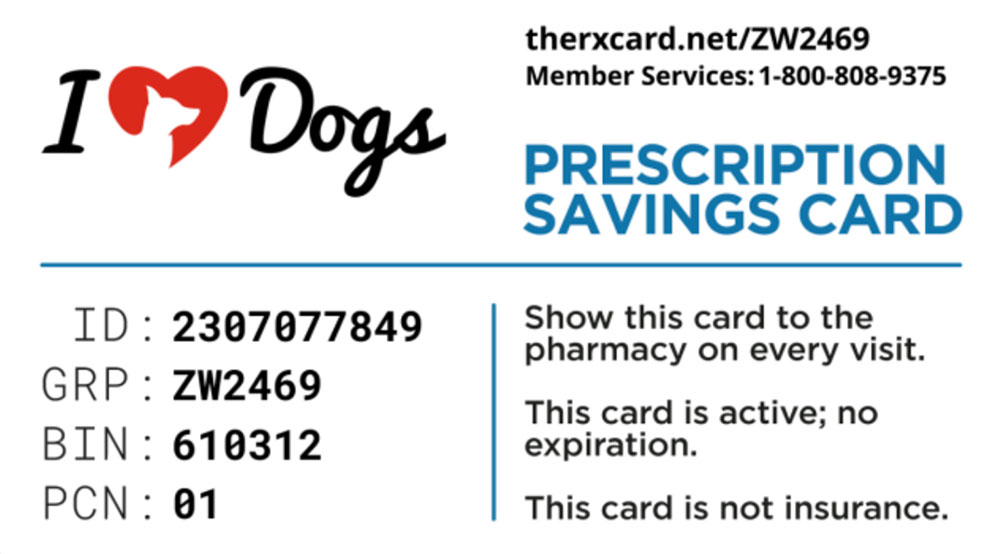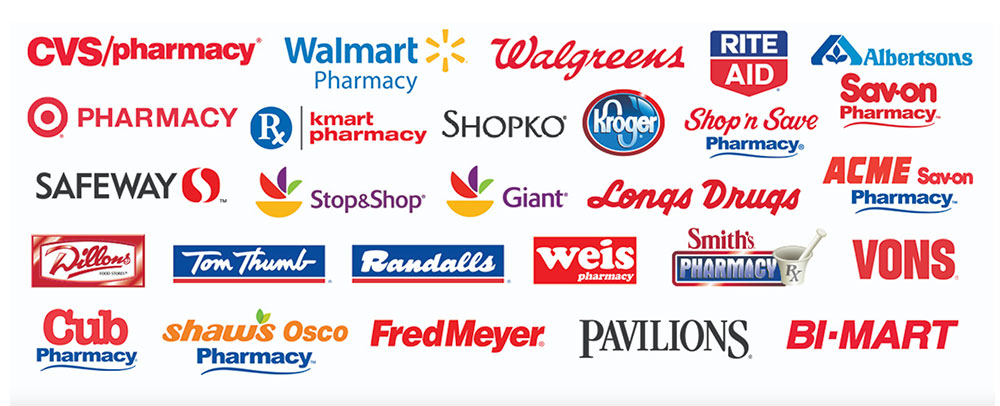Are you looking for a way to save your dog’s Ceftazidime prescription? Our Rx Discount Card for Pets can save you up to 80% of your pet’s Ceftazidime.
What Pharmacies Accept This Ceftazidime Coupon Card for Pets?
This card is accepted at over 60,000 participating pharmacies in the US, including:
How Much Will My Pet’s Ceftazidime Cost Using This Coupon?
In order to view a real-time pricing estimate, please use our pricing lookup tool here.
How Do Prescription Discount Cards for Pets Work? How Can It Help Me Save On My Dog’s Ceftazidime Prescription?
Prescription discount cards for pets operate on the same principle as those for humans. They negotiate lower drug prices with pharmacies and pass those savings on to cardholders. Here’s a step-by-step look at how they work:
- Obtain a card: Many pet prescription discount cards are free and can be obtained online. Some companies allow you to print a card from their website or have a card mailed to you.
- Visit a participating pharmacy: These cards are usually accepted at a wide range of pharmacies. Before visiting, it’s a good idea to ensure that your pharmacy accepts your particular discount card.
- Present the card when paying: When you pick up your dog’s Cefotaxime prescription, present the discount card to the pharmacist. The discount should be applied to the cost of the medication.
- Enjoy the savings: The discount you receive will depend on the particular card and the pharmacy, but these cards can often result in significant savings. Keep in mind that these cards usually can’t be used in combination with insurance. You’ll have to calculate which method gives you the most savings: using your insurance or the discount card.
Using a discount card can potentially help you save on your dog’s Cefotaxime prescription by lowering the retail price of the drug. It’s important to compare prices from different sources and choose the most cost-effective and safe option for your pet. The effectiveness of discount cards can vary based on the medication, pharmacy, and the specific terms of the discount program.
Please consult with your veterinarian or a pharmacy for the most accurate and up-to-date information. This response is based on the information available as of my last training cut-off in September 2021.
What Are Some Common Reasons Ceftazidime is Prescribed for Dogs?

Benadryl, which contains the active ingredient diphenhydramine, is commonly prescribed for dogs in veterinary medicine for various reasons. It is an antihistamine that can help manage allergic reactions and provide relief from symptoms. Here are some common reasons why Benadryl may be prescribed for dogs:
- Allergies: Benadryl is often prescribed to alleviate allergic reactions in dogs, including seasonal allergies (e.g., pollen, grass) and environmental allergies (e.g., dust mites, mold).
- Itching and Skin Irritations: Dogs with skin conditions, such as dermatitis, hives, or insect bites, may be prescribed Benadryl to help relieve itching and reduce inflammation.
- Motion Sickness: Benadryl can be used to help manage motion sickness in dogs that experience nausea, vomiting, or restlessness during car rides or travel.
- Pre-anesthetic Medication: Benadryl may be administered as a pre-anesthetic medication to reduce the risk of allergic reactions or other adverse effects during surgical procedures.
It’s important to note that Benadryl should only be used under the guidance and prescription of a veterinarian. The dosage, frequency, and duration of treatment will depend on the specific condition being treated and the individual dog’s health status. Additionally, certain dogs may have underlying health conditions or sensitivities that require extra caution when using Benadryl.
Always consult with your veterinarian before administering Benadryl or any other medication to your dog. They can provide appropriate dosing instructions, ensure it is safe for your dog’s specific situation, and address any concerns or potential interactions with other medications your dog may be taking.
What Are Some Other Ways I Can Save Money on My Pet’s Ceftazidime Prescription?
Besides utilizing a pet prescription discount card, there are a few other ways you can potentially save money on your pet’s Benadryl prescription:
- Shop around for the best price: Prices for medications can vary between different pharmacies. Contact multiple pharmacies to compare the costs of Benadryl and inquire about any potential discounts or savings programs they offer.
- Ask about generic alternatives: Inquire with your veterinarian if there are generic versions of Benadryl available. Generic medications often have lower costs compared to brand-name versions while providing the same active ingredient and therapeutic benefits.
- Purchase larger quantities: Buying a larger supply of Benadryl, such as a larger bottle or higher quantity, may offer cost savings compared to purchasing smaller quantities more frequently. However, consult your veterinarian to ensure the prescribed quantity is appropriate for your pet’s treatment plan.
- Explore online pharmacies: Online pharmacies can sometimes provide lower prices due to reduced overhead costs. Ensure you choose a reputable online pharmacy that requires a prescription and operates within regulatory guidelines.
- Discuss alternative treatment options: Depending on your pet’s condition and the veterinarian’s recommendation, there may be alternative treatments or medications available. Discuss the potential options with your veterinarian to explore more cost-effective alternatives to Benadryl.
- Inquire about manufacturer rebates or assistance programs: Some pharmaceutical companies offer rebates or assistance programs that can provide discounts or financial assistance for certain medications. Check if any such programs are available for Benadryl or inquire with your veterinarian or local clinics for information.
Always consult with your veterinarian before making any changes to your pet’s medication or treatment plan. They can provide guidance, suggest cost-saving options, and ensure the chosen alternatives are appropriate for your pet’s specific needs and health condition.


 Toledo, United States.
Toledo, United States.